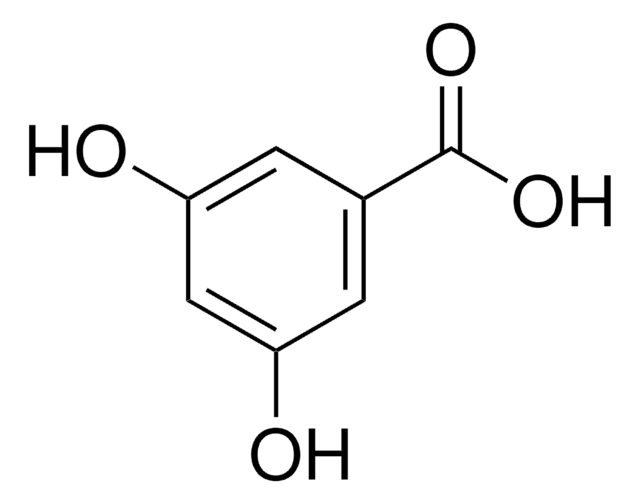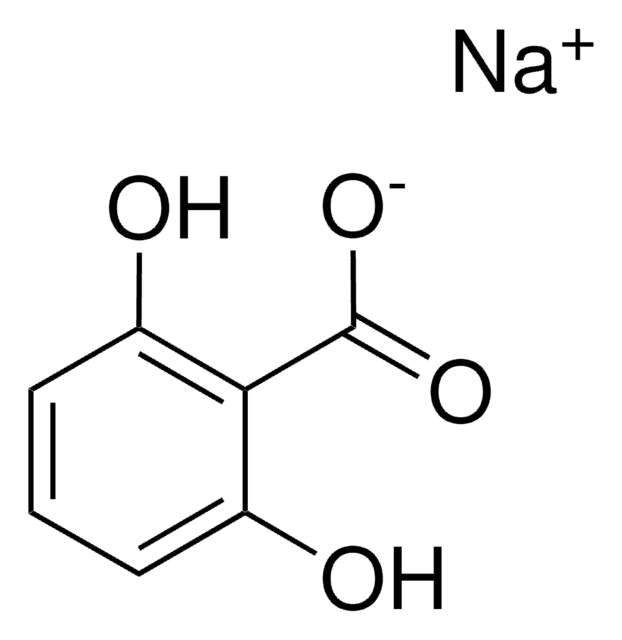D109606
2,6-Dihydroxybenzoic acid
98%
Synonym(s):
γ-Resorcylic acid
Sign Into View Organizational & Contract Pricing
All Photos(3)
About This Item
Linear Formula:
(HO)2C6H3CO2H
CAS Number:
Molecular Weight:
154.12
Beilstein:
2209755
EC Number:
MDL number:
UNSPSC Code:
12352100
PubChem Substance ID:
NACRES:
NA.22
Recommended Products
Assay
98%
form
powder
mp
165 °C (dec.) (lit.)
SMILES string
OC(=O)c1c(O)cccc1O
InChI
1S/C7H6O4/c8-4-2-1-3-5(9)6(4)7(10)11/h1-3,8-9H,(H,10,11)
InChI key
AKEUNCKRJATALU-UHFFFAOYSA-N
Looking for similar products? Visit Product Comparison Guide
Related Categories
Storage Class Code
11 - Combustible Solids
WGK
WGK 3
Flash Point(F)
Not applicable
Flash Point(C)
Not applicable
Personal Protective Equipment
dust mask type N95 (US), Eyeshields, Gloves
Certificates of Analysis (COA)
Search for Certificates of Analysis (COA) by entering the products Lot/Batch Number. Lot and Batch Numbers can be found on a product’s label following the words ‘Lot’ or ‘Batch’.
Already Own This Product?
Find documentation for the products that you have recently purchased in the Document Library.
J S Shane Rountree et al.
Organic letters, 11(4), 871-874 (2009-01-28)
The facile preparation of a novel 8-membered polyhydroxylated salicylic acid lactone from 2,6-dihydroxybenzoic acid and sodium thio-D-glucose is described. The key step involved a sodium hydride promoted intramolecular lactonization in the presence of excess TMSCl, which led to isolation of
Emine Ubay Cokgor et al.
Bioresource technology, 102(2), 567-575 (2010-08-24)
This study evaluated the kinetics of simultaneous biodegradation of peptone mixture and 2,6-dihydroxybenzoic acid (2,6-DHBA) by an acclimated dual microbial culture under aerobic conditions. A laboratory-scale sequencing batch reactor was sustained at steady-state with peptone mixture feeding. During the study
Derin Orhon et al.
Bioresource technology, 101(8), 2665-2671 (2009-11-27)
This study investigated the fate of 2,6-dihydroxybenzoic acid in a mixed microbial culture acclimated to peptone under aerobic conditions. A laboratory-scale sequencing batch reactor receiving a pulse feeding of peptone at the start of each daily cycle was used for
Toyokazu Yoshida et al.
Archives of microbiology, 181(6), 391-397 (2004-05-01)
A nonoxidative decarboxylase, 2,6-dihydroxybenzoate decarboxylase, was found in Agrobacterium tumefaciens IAM12048. The enzyme activity was induced specifically by 2,6-dihydroxybenzoate. The purified enzyme was a homotetramer of identical 38 kDa subunits. The purified decarboxylase catalyzed the nonoxidative decarboxylation of 2,6-dihydroxybenzoate and
Derin Orhon et al.
Environmental technology, 33(13-15), 1517-1522 (2012-09-20)
The paper mainly focused on illustrating the merit of respirometric analysis in assessing the inhibitory/toxic impact of xenobiotics on substrate biodegradation. It also evaluated biodegradation characteristics of these chemicals at continuous exposure through acclimation ofthe microbial culture. The nature and
Our team of scientists has experience in all areas of research including Life Science, Material Science, Chemical Synthesis, Chromatography, Analytical and many others.
Contact Technical Service








